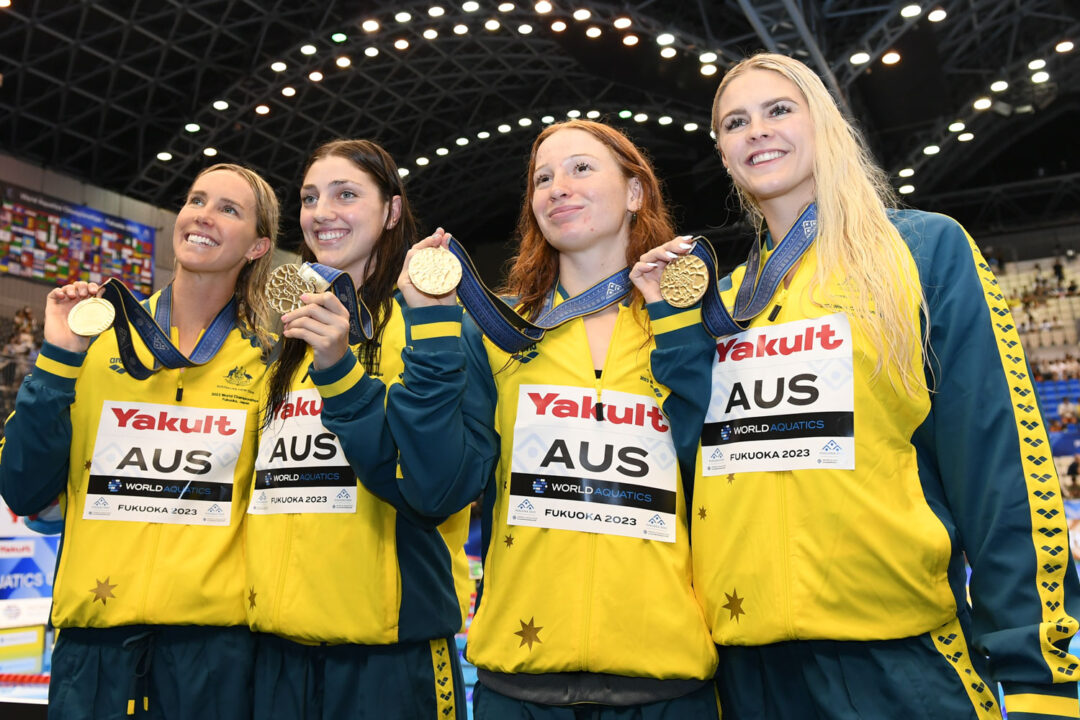2024 PARIS SUMMER OLYMPIC GAMES
- Pool Swimming: July 27 – August 4, 2024
- Open Water Swimming: August 8 – 9, 2024
- La Défense Arena — Paris, France
- LCM (50 meters)
- Meet Central
- Full Swimming Schedule
- SwimSwam Preview Index
- Pick ’em Contest
- How To Watch
- Entry Lists
- Live Results
- Prelims Live Recaps: Day 1
- Finals Live Recaps: Day 1
WOMEN’S 4×100-METER FREESTYLE RELAY – FINAL
- World Record: 3:27.96 – Australia (M. O’Callaghan, S. Jack, M. Harris, E. McKeon), 2023
- World Junior Record: 3:36.19 – Canada (T. Ruck, P. Oleksiak, R. Smith, K. Sanchez), 2017
- Olympic Record: 3:29.69 – Australia (B. Campbell, C. Campbell, M. Harris, E. McKeon), 2021
- 2021 Winning Time: 3:29.69 – Australia (B. Campbell, C. Campbell, M. Harris, E. McKeon)
- 2021 Bronze Medal Winning Time: 3:32.81
Final:
- GOLD: Australia (O’Callaghan, Jack, McKeon, Harris), 3:28.92
- SILVER: USA (Douglass, G. Walsh, Huske, Manuel), 3:30.20
- BRONZE: China (Yang, Cheng, Zhang, Wu), 3:30.30
- Canada, 3:32.99
- Sweden, 3:33.79
- France, 3:34.99
- Great Britain, 3:35.25
- Italy, 3:36.51
The Australian women broke their own Olympic Record swimming to a 3:28.52, capturing the country’s first gold medal of the 2024 Paris Olympics. The team broke their own Olympic Record of a 3:29.69 that they set back at the 2020 Tokyo Games in a 3:29.69.
That former Olympic Record was a World Record at the time. The same four who swam today broke the World Record last year in a 3:27.96 winning the 2023 World title.
Split Comparison
| AUSTRALIA – 2024 Paris Olympics | AUSTRALIA – TOKYO 2020 (2021) OLYMPICS |
AUSTRALIA – 2023 WORLD CHAMPS
|
|
| 1st | Mollie O’Callaghan (52.24) | Bronte Campbell (53.01) |
Mollie O’Callaghan (52.08)
|
| 2nd | Shayna Jack (52.35) | Meg Harris (53.09) | |
| 3rd | Emma McKeon (52.39) | Emma McKeon (51.35) | |
| 4th | Meg Harris (51.94) | Cate Campbell (52.24) | |
| FINAL TIME | 3:28.52 | 3:29.69 | 3:27.96 |
Meg Harris had the fastest split today with a 51.94 on the anchor leg. O’Callaghan was slightly off her time that helped break the World Record a year ago but today’s split was still almost a second faster than Bronte Campbell led off in a 53.01.
In typical O’Callaghan fashion, she came home fast on the first leg of the relay. She was 4th at the 50 mark but came home strong to put the relay ahead at the first exchange. The team never looked back, leading the rest of the race.


Who were the 5th and 6th members of this relay?
There are only four swimmers in a standard swimming relay.
If you’re asking about prelims swimmers, Olivia Wunsch and Bronte Campbell swam in the heats but not the finals.
Msg Harris anchoring was unexpected to most swim fans.
However despite being 3rd at trials, You can make a case Harris has been the 2nd best Aussie 100free being MOC. Also Meg and Mollie are the future of this team likely taking team Aus into Brisbane 2032. Why not blood her now while there is a good safety margin – that’s my take as couch coach!
I’m curious as to the reasoning behind having Meg anchor the relay.
It worked well, just curious to know why the coaches selected that lineup.
Meg performed so well, with great confidence. Wish she was swimming the individual 100, but next time hopefully.
This wasn’t the first gold. Arnie was the first gold in the poll, but we also won a cycling gold yesterday which was our first overall
Congratulations to Meg Harris. They gave her the anchor leg for the first time and she produced the fastest split of the race 51.94. A great swim.
A win’s a win, but the rest of the world is catching up! This relay was the first time for both USA and China where all their swimmers managed 52.x splits and we’ll be losing a bankable 51-52 low split in McKeon after this Olympic cycle (as well as reliable relay stalwarts C1 and C2, even if neither made it to the final here).
Hopefully Wunsch isn’t affected by her rough prelims lead-off and continues her improvement trajectory and the others stay at the top of their game or we could be at risk of losing the five-peat come LA (an absurd statement in itself!)
Let’s just enjoy the moment shall we, instead of worrying about their decline.
By 2028 there will be others, stop casting doubt so far out